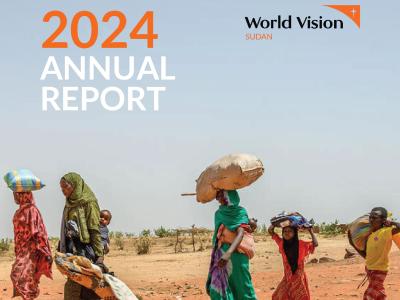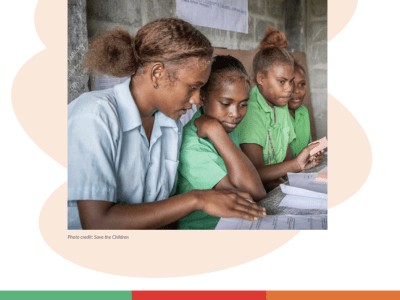publication / January 15, 2025
2024 Annual Report - Sudan
World Vision Sudan FY24 Annual Report: Highlights impactful humanitarian efforts, supporting 2.8M people, including 1.5M children, amid Sudan's ongoing crisis.
publication / January 10, 2025
Middle East Crisis (MEC) Response |LEBANON SITREP #10
Lebanon is grappling with a severe humanitarian crisis following 14 months of escalating violence. Over 4,000 people have been killed, including 290 children and 790 women, while nearly 1.2 million people have been displaced. Despite a 60-day cessation of hostilities, fragile security conditions prevent over 160,900 people from returning home. Many remain in temporary shelters, facing destroyed infrastructure and limited access to basic services. Nearly 100,000 homes have been fully or severely damaged, rendering thousands homeless and exacerbating vulnerabilities among at-risk populations.
article / January 13, 2025
Bridging the Health Gap in East Darfur
How World Vision is bridging health gaps in East Darfur, providing vital medical and nutritional support to vulnerable communities amidst conflict.
publication / January 9, 2025
Climate-Smart Agriculture Guidance Note
World Vision Climate-Smart Agriculture Guidance Note
press release / January 15, 2025
World Vision welcomes ceasefire as glimmer of hope, but warns humanitarian situation remains catastrophic
World Vision welcomes ceasefire as glimmer of hope, but warns humanitarian situation remains catastrophic
publication / December 20, 2024
Middle East Crisis (MEC) Response |LEBANON SITREP #9
The weeks following the cessation of hostilities in Lebanon have focused on assessments of the high humanitarian needs and economic costs. The conflict has caused massive destruction, displacing nearly 1.2 million people, with 179,000 still unable to return home due to safety concerns, destroyed infrastructure, and limited access to essential services. Though the number of people in formal shelters has dropped to 6,600, the strain on local communities and infrastructure continues to be overwhelming. The hardest-hit areas include Nabatieh and Tyre, where families with young children and elderly members face prolonged displacement are grappling with severe water shortages, unreliable electricity, and damaged facilities.
publication / December 30, 2024
Make it 18 Report: Community Voices on Child Marriage Reform in Solomon Islands
Make it 18 Report: Community Voices on Child Marriage Reform in Solomon Islands
opinion / January 2, 2025
The 2004 tsunami taught me many things, but six in particular
Margarettha Siregar shares six things the humanitarian industry should learn from the 2004 tsunami disaster
publication / December 6, 2024
Middle East Crisis (MEC) Response |LEBANON SITREP #8
After over two months of intense conflict and nearly a year of escalating hostilities, a ceasefire came into effect on 27 November at 04:00 local time, marking a pivotal moment for Lebanon. The agreement is rooted in implementing UN Resolution 1701 (2006), establishing a 60-day timeline for withdrawing forces from southern Lebanon and deploying Lebanese Armed Forces (LAF) along the border.
In the hours preceding the ceasefire, 26 November witnessed devastating airstrikes by the country to the south of Lebanon, causing significant destruction across multiple areas. Beirut was heavily impacted, particularly its central district and southern suburbs, leading to widespread panic. The Bekaa Valley suffered similar devastation, while Saida and the Rashidieh Palestinian refugee camp were targeted for the first time since October. Additionally, airstrikes severed the Aridah crossing between northern Lebanon and Syria, further isolating the country.
Since the ceasefire, many displaced families have begun returning to their communities. However, these returns are fraught with challenges, as many encounter destroyed homes, damaged infrastructure, and limited access to basic services. Others remain unable to return due to safety concerns and access restrictions, particularly in southern Lebanon.
publication / December 6, 2024
Middle East Crisis (MEC) Response |LEBANON SITREP #8
After over two months of intense conflict and nearly a year of escalating hostilities, a ceasefire came into effect on 27 November at 04:00 local time, marking a pivotal moment for Lebanon. The agreement is rooted in implementing UN Resolution 1701 (2006), establishing a 60-day timeline for withdrawing forces from southern Lebanon and deploying Lebanese Armed Forces (LAF) along the border.
In the hours preceding the ceasefire, 26 November witnessed devastating airstrikes by the country to the south of Lebanon, causing significant destruction across multiple areas. Beirut was heavily impacted, particularly its central district and southern suburbs, leading to widespread panic. The Bekaa Valley suffered similar devastation, while Saida and the Rashidieh Palestinian refugee camp were targeted for the first time since October. Additionally, airstrikes severed the Aridah crossing between northern Lebanon and Syria, further isolating the country.
Since the ceasefire, many displaced families have begun returning to their communities. However, these returns are fraught with challenges, as many encounter destroyed homes, damaged infrastructure, and limited access to basic services. Others remain unable to return due to safety concerns and access restrictions, particularly in southern Lebanon.







